
Ann Leslie
An email drops into the inbox. “Dear Codgers,” it starts. “I’m sorry to inform you…”
Given that the distribution list is a collection of aged hacks, these messages are not a rarity. They usually elicit a flurry of “that’s sad” replies. But rarely as many and as heartfelt as on Tuesday, when we learnt that Ann Leslie had died in her sleep on Sunday. “A great journalist” was the most common reaction; remarkable, inspirational, ground-breaking were other adjectives.
Leslie was not just any journalist – she was a Dame of the British Empire and our trade doesn’t produce too many of those. Retired editors may get knighthoods, but it is unusual for people working out in the field or writing columns to be so recognised. The fact that not only was she honoured, but that – having written for Conservative papers all her life – she was given her damehood by a Labour Prime Minister (Tony Blair in 2006) was further evidence of her particular place in the media panoply.
Leslie was both distinguished and distinctive. She had one of those unforgettable voices, like ubiquitous voiceover man Peter Dickson and Mariella Frostrup, that can be summoned up in the brain at will. I cannot call to mind the voices of either of my parents, but Leslie’s is clear in my ears as I type. There was much more to her, obviously, than her cigarette-tinged tones, but they helped to make her as recognisable to the wider public, who had seen her on Question Time, heard her on Any Questions, as she was in journalistic circles. So while it was mildly surprising to see and hear her death being recorded on the main television news on Tuesday night and on the Today programme yesterday morning, on reflection it made sense.
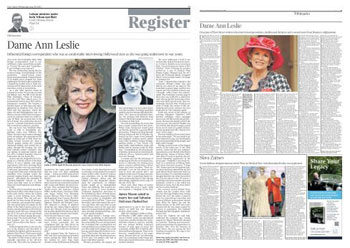
How disappointing, therefore, to see that her first newspaper, the Express, failed even to note her passing. The Guardian shared the sin of omission. Somehow I found that even worse, especially since it has probably the best record of any national in reporting what might be termed “culture” deaths – artists, writers, musicians. But there, on yesterday’s front page was a big picture of Nicola Bulley, a picture we have seen dozens of times. The Mail (on which Leslie spent most of her career) and Guardian may not be the best of friends, but a bit of grace would not have gone amiss here. Nor was there an obit in the Journal section. Maybe that was because Leslie’s death was sudden (those Codger tributes all said it was a shock, as she’d been lunching with the best of them a few weeks ago) and time was needed to prepare something fitting. By contrast, both the Telegraph and the Times did a good job.
The Guardian did, however, make up some ground this morning with a personal piece by Maggie Brown that focused squarely on her journalistic record rather than anecdotes about David Niven and Salvador Dali dropping their trousers in her presence.

As to the Mail, well… this is a paper that is never coy about writing about itself, so I think in this instance it would have been perfectly natural for it to put its former star writer across the top of the front page, rather than Sarah Vine telling the world about Harry Enfield and her breasts. But what do I know?
There was further dismay when I got to page 4 and read the news report, headlined “The Mail’s Ann Leslie…” This started with the usual cliché: “Tributes were paid last night…” and cantered off onto a cuttings job devoid of soul or style. OK, you don’t need gush and slush, but the staccato “she did this, she did that” felt inadequate. But I was too quick to judge. This was not, as I feared, the Mail’s coverage of the death of one of its own; it was the taster, the “here are the bald facts, look further on for the meat”. Thank heavens for Richard Kay and Geoffrey Levy – and the paper’s design team – for a spread that had a real feel for this extraordinary woman.
Where does the puff end and the splash start?

That Sarah Vine puff yesterday came in the new format that, to my eye, could do with a tweak. The previous standard was to run a coloured panel, either above or below the titlepiece, usually with the text in white. This was a good idea because Mail puffs can be quite wordy – sometimes they can take up the top half of the page – and it was quite clear where the puff ended and the splash began.
Then in January, the paper had a promotion offering its content digitally for a penny a day. The type for this offer came in a variety of colours, sometimes bold, sometimes italic, on a white background. In the intervening weeks, this plain-background format has appeared more frequently. It hasn’t taken over, so is presumably seen as just another variant available to the designers.
The trouble is, though, that this variant doesn’t generally have a box; it is separated from the body of the page by a rule – a rule that may be thin or which sometimes doesn’t go right across the page. The end result is that sometimes you get the impression that the puff is linked to or even part of the splash, as with this set of health panels in March and these columnist quotes from this month. And when the puff text is in bold black on top of a bold black splash headline, it feels like a type overdose.
Whatever you think of the Mail’s outlook on life, few would deny that it is the most professionally put-together paper on Fleet Street. But some of its recent front pages are just plain ugly.
Johnson (and his new employer) ignores Acoba (this time)
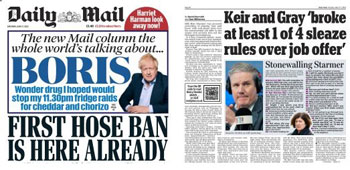
Those new white-background puffs have been employed, among other things, to promote the paper’s new columnist (although he gets a box). There is nothing that particular writer likes more than to be the centre of attention, so I shall venture no opinion on his efforts. I would, however, question the selling line “the column the whole world is talking about” – the whole world? And are those who are talking about it doing so in a positive way? Surely the notion “all publicity is good publicity” was debunked decades ago?
And, second, remember how the paper made such a thing about Sue Gray going to work for Keir Starmer and how she had broken the rules and how the Advisory Committee on Business Appointments (Acoba) might make her wait months before taking up the job? How strange, then, that that paper failed to report yesterday that Acoba had found that a former prime minister had broken the ministerial code by advising the committee of his new job only half an hour before his first work for his new employer went live.
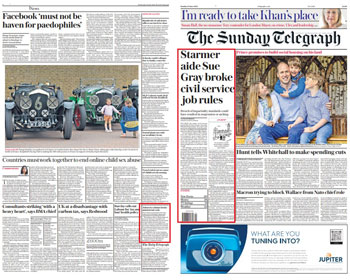
The Telegraph, perhaps less than enthusiastic about the defection of its erstwhile star, did report the Acoba finding against Johnson – though not Eric Pickles’s suggestion that the whole system needed looking at because expecting people to be “good chaps” wasn’t working these days. Well, there wasn’t really room for all that in the bottom nib on page 2. Its Sunday sister’s coverage of a similar verdict on Sue Gray was rather easier to spot.
Murdoch’s guest list
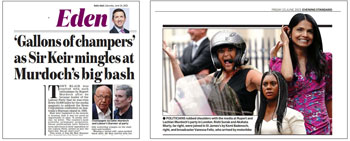
The Mail is to be commended, however, for reporting something else that seemed to have escaped the attention of most other papers: Rupert Murdoch’s annual summer bash in St James’s last Thursday. According to its Eden Confidential diary, guests were served “gallons” of champagne and beef and dauphinoise potatoes, sprinkled with rocket. Those guests included Keir Starmer, which was the point of the piece, and shadow chancellor Rachel Reeves. The Prime Minister and the Mayor of London were also there, as were half the cabinet and a host of national editors and political editors.
The only other papers to write anything about the party were the Evening Standard, which managed a couple of pictures, and the Mirror, which mentioned it in passing on a spread about Rishi Sunak and the economy. Neither reported that Starmer was there, which was a fairly spectacular example of missing – or avoiding – the story.
Supposedly high-minded editorial types might pooh-pooh the notion that such events are newsworthy, sniffing, “We’re not the Tatler, you know”, but even the worthiest papers have gossip columns whose bread and butter is who went to which party and what was said there. When you have the people running the country socialising with the people who want to run the country and the people who like to tell everyone how they should be running the country, it’s fair to say it’s a matter of public interest.
If only for readers to ask – as the Twitterati did – what on earth were Starmer and Reeves thinking of?
Prince to the rescue

It’s a tough act to pull off: man who lives in a palace vows to end homelessness. Let us suppose that the Prince of Wales’s heart is in the right place. He is certainly being given a following wind by the royalist press: the splash and a spread in the Express on Saturday telling readers what he was going to do, and the same treatment from the Telegraph on Monday, when he had actually set out his plans.
The Telegraph had also run a front-page story on Saturday – under a photograph of a top-hatted William with his wife in an open carriage at Royal Ascot. The headline was “Prince rides to the aid of homeless”. Didn’t anyone on duty last Friday night stop and think, “Er, this might jar a bit”?
The prince’s initiative was obviously widely reported by almost everyone. As it should be. What a shame, then, that what might have been the ideal parallel story – an IFS report showing that only one in twenty homes being offered for rent on the private market would be within reach of people on housing benefit – was reported only by the i and the Guardian. There is an acute shortage of social housing, benefits have been squeezed while rents are rocketing. The prince is right, we need to get people off the streets. But we also need to find somewhere, other than hostels and emergency shelters, for them to live.
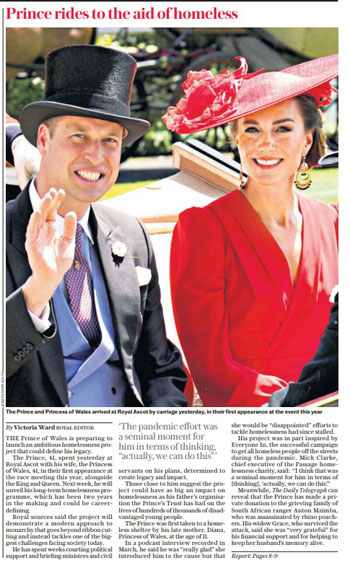
That Telegraph picture of William and Kate on Saturday was the seventh royal main image for the paper this month and there was another of the prince to go with the Tuesday splash. The score so far is Waleses 4, King and Queen 3, Harry 1. No room for Fergie, whose breast cancer surgery made the cover of the Express, Sun and Mail.

The i's high mortgage rate

While we’re counting, I was moaning a couple of weeks ago about the i and its mortgage obsession, most particularly its decision to splash on speculation about interest rates on the day after the Nottingham stabbings. To be fair, those predictions were widely reported elsewhere in the following days and it obviously became a hotter issue as the Bank’s MPC meeting approached.
A key factor in newspaper editing is knowing when to focus on an important subject and make sure you get the message across and when to pause from your agenda to react to live events. It’s a tricky balancing act. Used cynically, those important agenda / campaign subjects can be a convenient distraction from events you’d rather draw a veil over.
The i is definitely not guilty of that. It has a younger audience than most of our dailies, readers who are doubtless at their wits’ end as to how they’ll ever be able to afford to buy a house – or to keep up the payments if they’re lucky enough to have climbed onto the first rung of that wretched ladder. But I do still feel that it is overdoing it. That story was the first of eight on mortgages in a two-week period this month – a run interrupted only by the Commons privileges committee report on Boris Johnson.
On the other hand, it was almost alone in keeping up with events in Russia and Ukraine before the mutiny at the weekend.
Butwhatabout…

Talking of flogging a dead horse, the Mail was fulminating again yesterday at Sir Bernard Jenkin over his failure to say whether he had broken lockdown rules by attending a party for his wife’s birthday. It brought out the capital letters to say Jenkin was “STILL silent” in the headline over a story that said he was under “mounting pressure to come clean”. There was also a leader.
Jenkin was one of the Conservative members of the committee that found Johnson was in contempt of parliament. The Mail has been questioning him for nearly two weeks; the Sunday paper found “proof” that he broke the law; Jenkin has “stormed off” in the face of the barrage, and Daniel Johnson has opined that his “reluctance to give a straight answer tells you everything” you need to know.
This is a classic case of deflection and deliberately missing the point. It is utterly irrelevant to the verdict on Johnson whether Jenkin was himself guilty of a breach of the rules. Jenkin and his fellow committee members were not being asked to sit in judgment on the Downing Street parties per se; they were there to consider whether Johnson had lied about them to Parliament. Since Jenkin has not been asked about his wife’s birthday drinks in the Commons and has certainly not told MPs that they didn’t happen, the paper is comparing apples and oranges.
Meanwhile, has anyone asked Ted Verity whether he attended a leaving party for 30 people at the Mail on Sunday in October 2020, when gatherings of more than two people indoors were forbidden?
Front page of the fortnight
The Wagner group mutiny in Russia was one of those events where the internet leaves old-fashioned media standing. So much happening so fast. The trouble is, it’s almost impossible to work out which source is reliable, who to believe. And Elon Musk has made it even harder with his blue-tick revolution.
Sadly, most newspapers have cut their foreign correspondents’ budgets to the bone and those that do still have Russian specialists have naturally deployed them to Ukraine. So who’s to say what’s really going on with Putin and Prigozhin? We can have explainers on what the Wagner group is, we can have mini biographies of the players, including the Chechens and their leader Kadyrov. But beyond that, it’s all – literally – Kremlinology; speculation and surmise, however educated.
I therefore acknowledge my own ignorance of the matter – which is why I’ve refrained from any commentary on the coverage – and choose this Sunday Telegraph front merely because of its clarity and elegance. As for the words on the page, I could not possibly comment.
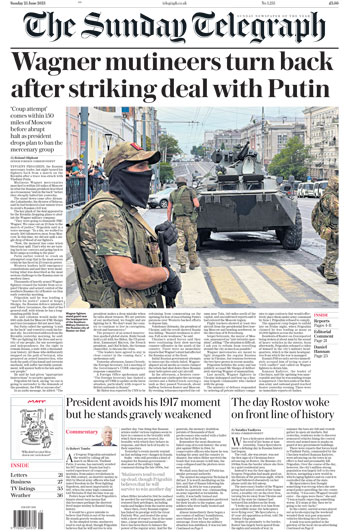
PS. I do, however, feel qualified to remark on the daily's coverage of the attack on Kramatorsk on Monday night. Telegraph correspondent Colin Freeman and his translator had been studying the menu in the Ria Lounge when they were called away for an interview at the far side of town just before the bar was bombed. That call could have saved their lives – or it might simply have denied the paper a first-hand account of the immediate aftermath. To my mind, Freeman and his paper got the better deal – safety, a “brush with death” story, and a nice piece of background colour on the targeted neighbourhood.
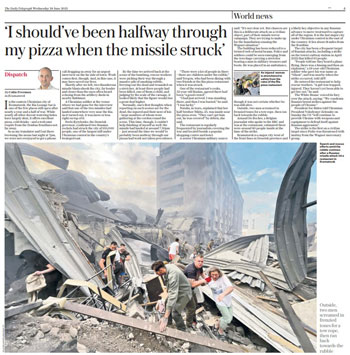
All good then? Well, yes. But that headline? Should’ve? (a misquote of the equally egregious “would’ve” from the text) Come on. Standards. Please.
Liz Gerard’s Notebook is a fortnightly column published in the InPubWeekly newsletter. To be added to the mailing list, enter your email address here.












